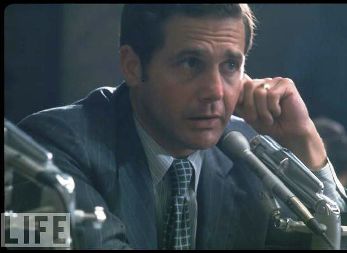At the height of all the Watergate scandal coverage in the ‘70s, TIME magazine ran an interesting story about Jeb Stuart Magruder.

Don’t remember Magruder?
He’s the man frequently mentioned in the first hour of the movie All the President’s Men. Based on the 1974 book by Washington Post reporters Bob Woodward and Carl Bernstein, the two investigated the initial break-in at National Democratic Headquarters at the Watergate hotel in Washington DC which ultimately led to the resignation of President Richard Nixon.
Robert Redford, as Woodward, utters the famous question to an inside bookkeeper who begins to spill the beans. “Is Magruder the only ‘M’ to receive money?”
In the “immensely complicated scandal with a cast of characters as varied as a Tolstoy novel,” reporter Woodward wrote, Magruder was Deputy Director and assistant to the Director of the Committee to Re-elect the President. (In the film, it was given the suitable reference CReeP.)
The TIME article points out that one of the last courses Magruder took at Williams college, was a class entitled, “Religion and Social Ethics: The types of ethical thought developed in the first semester will be applied to such problem areas of contemporary society as 1) race & racism; 2) sex & family; 3) economic ethics; 4) political ethics; 5) national ethics…”
“Ordinarily,” TIME writes, “courses of this kind are soon largely forgotten by student and teacher alike. But 15 years later, this one was injected into national politics. Under tight control for most of his testimony before the Ervin committee, Magruder grew momentarily impassioned when he recalled the experience [of taking the class taught by William Sloane Coffin].”
Why, I wondered, would a Watergate figure like Magruder get overheated regarding a college class?
“[Magurder] agreed with Coffin that, because of Watergate, he could be said to have failed the course. But he argued that Coffin’s own antiwar activities helped him justify his misdeeds.”
Now, this is a new rationalization that I absolutely must add to my collection: Commit an illegal and/or unethical act and blame the college teacher from your ethics class for his antiwar protests.
In a TIME interview, “[Coffin said he] does not find Magruder’s arguments persuasive and still flunks him on ethics. ‘There was not very much on civil disobedience in the ethics course I taught,so poor old Jeb never learned to tell the difference between civil disobedience and violations of the Constitution by the Administration.’
“He points out that at the placid Williams campus in the 1950s, there were no civil rights or antiwar protests to teach the meaning of ethics. ‘Values are not so much taught as caught. Without the experience it’s pretty hard for the ethics to sink in. Your education is largely a game of intellectual volleyball.’
And this next part from Coffin is interesting:
“ ‘Magruder ended up lumping all lawbreakers together. By that way of thinking, Jesus and Jimmy Hoffa are two of a kind. He has never examined the possibility that sometimes there is no way to test the constitutionality of a law except to disobey it. You could say that however pathetic our [antiwar] efforts were, we were trying to keep the nation under law or under God, whereas Jeb and his cohorts were trying to keep it under Nixon.’ ”
Magruder’s rational could easily fall under the False Necessity Trap. It’s based on the assumption that necessity – protecting the president and whatever good he may possibly bring about – breeds propriety. This often leads to an end-justifies-the-means mentality, “treating assigned tasks or desired goals as moral imperatives,” ethicist Michael Josephson says.
As German philosopher Frederick Nietzsche wrote, “Necessity is an interpretation, not a fact.”
It would seem that Magruder was absent the day they discussed discernment.
“The real moral of this story,” Coffin tells TIME, “may be that to do evil, you don’t need to be a Bengal tiger. It is sufficient to be a tame tabby.”
Political theorist Hannah Arendt perhaps says it better, “Most evil is done by people who never make up their minds to be good or evil.”
Ethics must be taught, discussed, updated with both positiveand negative examples, then taught and discussed again.
“Those who do not learn from history,” philosopher George Satanyana wrote, “are doomed to repeat it.”
Comments









